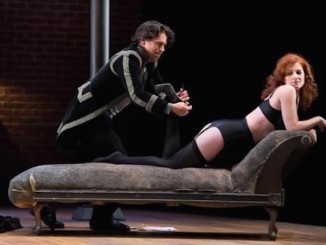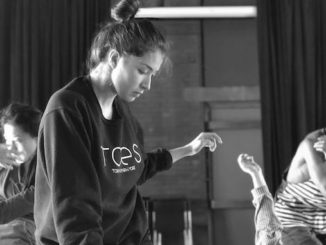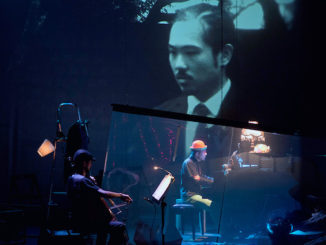I learned about Robert Lepage at university when I was studying divised theatre. It’s been almost seven years since I left and in that time my life has become decidedly less playful. After a rainy week, where I was feeling less than 100%, Lepage and his collaborators in Ex Machina managed to bedazzle me with some much needed theatre magic.

I am British, I have only lived in Canada for 18 months – I know my history reasonably well, but I had no idea how deeply the country was, and is still, affected by its British predecessors and how strongly the divide between Anglophone and Francophone Canadians is truly felt. It is this tension that paints the backdrop for 887, an autobiographical play about Lepage’s task to learn a poem, delving deeply into his childhood in Québec City to help him enhance his memory.
I mentioned theatre magic, and it was truly here in abundance. Set pieces unfolded from what looked like thin air, projections and live action cameras were used to further assist the mood. Lepage’s sense of play reminded me of why he was so inspiring to me throughout my early adulthood. But, somewhere in the sense of wonder he filled the room with, there were twinkles and tinges of sadness that extended far beyond nostalgia. I understood, too. When we think of our childhood, it is a place so locked into such a specific time, and no matter how we try, we imagine, we play or pretend, we can never go back. It will always be just that inch too far out of reach. Specifically Lepage’s memories of his father (who’s death date I am almost certain was the number late on the black cab he drove through the actor’s mind) were most touching of all. He seemed to be a man that shaped Lepage, more so than his surroundings in an increasingly tense Québec City; he was, after all, the man that gave him his English tongue.

Lepage’s English tongue battles for stage time with his French, something that culminates at the end of the play with the much discussed and iconic poem, Speak White. As he delivers the poem he so long struggled with throughout the play, Lepage is most alive, channelling whatever he lost of himself in Québec.
Beautiful, magical, surprising, engaging; Lepage’s story might be different from our own but it was nice to sit inside his head for two hours as he unravelled his memories in front of us. For me at least, it made me think that, given enough time, there might just be a moving box of unfolding compartments containing my own shaping memories, just waiting to be pulled open.
It was a delight to visit 887 Murray Ave. I hope that Lepage’s legacy continues to grow from it.
887 is a must see and will be running at the Bluma Appel Theatre until the 16th April.




